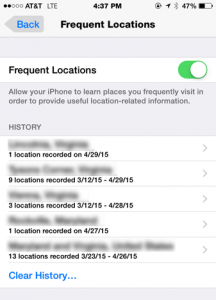Are you being tracked?
![]() Are you being tracked? Should you care? a reader asks…
Are you being tracked? Should you care? a reader asks…
Hi Chris, I’ve been reading about how my cell phone is tracking my location and am concerned about my privacy. Can you tell me about this and what I should do, if anything to keep unsavory creatures from tracking my whereabouts?
There are a lot of technology reporters out there who are searching for eye-grabbing headlines. Frankly, I think most of the brou-ha-ha is just paranoia-mongering. And at least here in the US, there seem to be a vocal minority of people who are eating it up. For example, NBC News recently aired a puff-piece about location tracking in this newscast. What they gloss over in the dialogue is that the only way for anyone to see your location is if they have access to your account (Apple ID or Google account). That’s a whole ‘nother issue, please see my article on protecting yourself from hackers. Here’s my perception of reality on this whole location tracking fear-mongering:
 The FCC says over 80% of calls to 911 are now being made from cell phones. Unlike landlines, cell phones are mobile, so the 911 operator can’t fix your location like they can for your home phone (in case you can’t speak to tell them where you are). As a result, many cellular service providers (AT&T, Verizon, T-Mobile, Sprint, etc.) have added E911 services to some of their cell phones. This feature simply attempts to triangulate your geographic location using multiple cell towers in range of your phone, and is required by the FCC. I can’t think of any reason someone would object to this.
The FCC says over 80% of calls to 911 are now being made from cell phones. Unlike landlines, cell phones are mobile, so the 911 operator can’t fix your location like they can for your home phone (in case you can’t speak to tell them where you are). As a result, many cellular service providers (AT&T, Verizon, T-Mobile, Sprint, etc.) have added E911 services to some of their cell phones. This feature simply attempts to triangulate your geographic location using multiple cell towers in range of your phone, and is required by the FCC. I can’t think of any reason someone would object to this.
Some cell phones have a GPS feature built-in, that can provide better tracking and geo-location services. All the cellular service providers have made this a feature that can be turned off in the settings for the cell phone. Again, there really isn’t a sane rationale why anyone should worry about this for emergency services.
 Smartphones are another matter though, in addition to GPS, they have location features built into many of the apps. And the phone itself is probably tracking everywhere you go. Again, this can be easily turned off in the settings. For iPhones, just look under Privacy and Location services. You can turn off location services completely, or just turn it off app by app. iPhones also keep track of your frequent locations, and you can easily clear this out or turn it off:
Smartphones are another matter though, in addition to GPS, they have location features built into many of the apps. And the phone itself is probably tracking everywhere you go. Again, this can be easily turned off in the settings. For iPhones, just look under Privacy and Location services. You can turn off location services completely, or just turn it off app by app. iPhones also keep track of your frequent locations, and you can easily clear this out or turn it off:
- Tap settings, then Privacy, then Location Services
- Scroll down and tap System Services, then Frequent Locations
- You can slide the slider to Off, or tap the Clear History
But these frequent locations are kept on your iPhone and not shared with apps you’ve installed unless you give the app permission (not turned on by default). Apple does collect some location information, but this is never personally identified with you, only anonymous, crowd-sourced data. So neither Apple nor anyone else can track you unless you give specific permission, and all of this is controllable in the Location Services area of Settings.
Android phones are a bit different, all your location information is sent to Google. You can access it from anywhere on any computer, but you have to have access to your Google account, so not just anyone can find out where you’ve been. Again this is also easy to turn off if you’re concerned about your privacy, just go into the settings menu and under “Location” un-check the box next to Google’s Location Services.
 But these location services are not being done to track you for nefarious purposes, both Apple and Google use this to help you find things like nearby restaurants, and perhaps to give you some targeted advertising. Plus more accurate locating in case of emergency. The news stories blow this up way out of proportion and get folks worried over pretty much nothing. Yes, it’s quite possible that ‘the government’ could be accessing all this data, but really, do you think your government cares about where you go? Unless you’re a terrorist or big-time criminal? If you are, then you should be concerned. And frankly, I’d sleep better at night if the government were actually tracking those people. But for all us ordinary consumers, the government has absolutely no interest in tracking you, you’re just one of hundreds of millions. And hackers really don’t care about this information either, even if they could get to it (they can’t). In all actuality, there’s much juicier information on the internet about you, and it’s all about what you shop and buy – that’s for all the commercial entities out there who want to sell you stuff. Now that’s worth some money!
But these location services are not being done to track you for nefarious purposes, both Apple and Google use this to help you find things like nearby restaurants, and perhaps to give you some targeted advertising. Plus more accurate locating in case of emergency. The news stories blow this up way out of proportion and get folks worried over pretty much nothing. Yes, it’s quite possible that ‘the government’ could be accessing all this data, but really, do you think your government cares about where you go? Unless you’re a terrorist or big-time criminal? If you are, then you should be concerned. And frankly, I’d sleep better at night if the government were actually tracking those people. But for all us ordinary consumers, the government has absolutely no interest in tracking you, you’re just one of hundreds of millions. And hackers really don’t care about this information either, even if they could get to it (they can’t). In all actuality, there’s much juicier information on the internet about you, and it’s all about what you shop and buy – that’s for all the commercial entities out there who want to sell you stuff. Now that’s worth some money!
This website runs on a patronage model. If you find my answers of value, please consider supporting me by sending any dollar amount via:
or by mailing a check/cash to PosiTek.net LLC 1934 Old Gallows Road, Suite 350, Tysons Corner VA 22182. I am not a non-profit, but your support helps me to continue delivering advice and consumer technology support to the public. Thanks!







